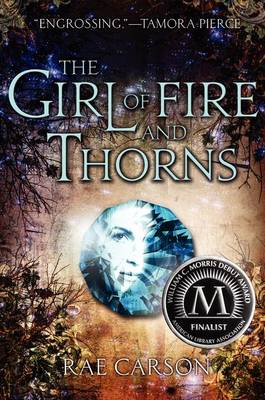Reviewed by e_rodz_leb on
I first started listening to the audio book, but unfortunately, this is not the best format for me when reading fantasy. It is really hard for me to remember all the names of people and places when they are not commonly known words and it is a lot easier to read instead. Since I already had a copy of the book, and it started getting really interesting, I finished the book in no time.
Girl of Fire and Thrones was pleasant surprise for me. Elisa quickly grew on me.
Lucero-Elisa (lucero means star) is a princesses and God’ chosen one. She grew up in privilege and led a very sheltered life of study and prayer. All of the sudden she’s married off to King Alejandro, a complete stranger, and she doesn’t even know why. Elisa is an endearing character because, although she is plagued with self-doubt, self-esteem and body issues she rises above all of it and grows to be an amazing and strong female character. She is extremely start and knows a lot about strategy, which comes in very handy when her country is threatened by war. Her outer and inner change happened gradually and it’s very believable. I enjoy her journey and its outcome.
Most of the characters are well fleshed out and memorable as well, so I’ll mention a few of them. Alejandro is the king of Joya d’Arena (means jewel of the sand); he tries to be kind to Elisa, but after all she is very young (16) and he doesn’t know her either. Hi is very weak of character and all his sneakiness made me dislike him. I like Lord Hector, in charge of the royal guard, since he values Elisa and is very pleasant to her. I hope something deeper develops beteween them in the next book. Ximena is Elisa’s nurse and guardian and she loves her deeply. Oh, Humberto, I really love you.
The setting is a bit of a mystery to me. Most names of places and people are in Spanish (or Latin), and some of the places described sound almost like a Mexican villa. However, the kingdom of Joya is huge and covers desert, forests and mountains, but it feels almost like an Arabian county. Distances are outrageous (it takes a month to get from the capital to the mountains) and customs (food, dress) change from area to area. The Inviernos (which means “winter”) are describes as white, fair haired and with light eyes, but a barbaric, which reminds me of Vikings.
The plot is very original. I found a bit weird the fact that the Godstone was in Elisa’s navel and acted sort of like a danger and mood detector and like a GPS, but overall it worked with the rest of the story. Also, I found Elisa’s lack of faith in her abilities and her continuous thought of food and her appearance a little bothersome. The book has heavy religious undertones, but this is fiction, so of course it is all made up. The writing was easy to read and flawless; still my favorite part, besides the plot is the characterization.
Some of my favorite quotes:
“I almost stab him right then. What would this man know of God’s will? He is insane, hardly human with his wild eyes and predatory hunger…Now even, my enemy presumes to know the mid of God…I am his bearer and I understand nothing.” Elisa
“My heart hammers in my throat, my breath comes too fast, but I force my hands to relax, to lower the daggers. Someone is saving me. Someone who called me ‘Your Highness’ “…All the rage and grief and fear flow out of me until my body is limp. I stumble toward Lord Hector, wrap my arms around him.” Eliza
“Honor from death,” I snap, “is a myth. Invented by the war torn to make sense of the horrific. If we die, it will be so that others may live. Truly honorable death, the only honorable death, is one that enables life.” - Eliza
About the cover: I’m not too crazy about the cover, which is probably one of the reasons it took me so long to read this book.
Reading updates
- Started reading
- 1 December, 2012: Finished reading
- 1 December, 2012: Reviewed
